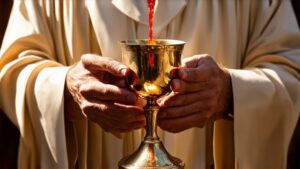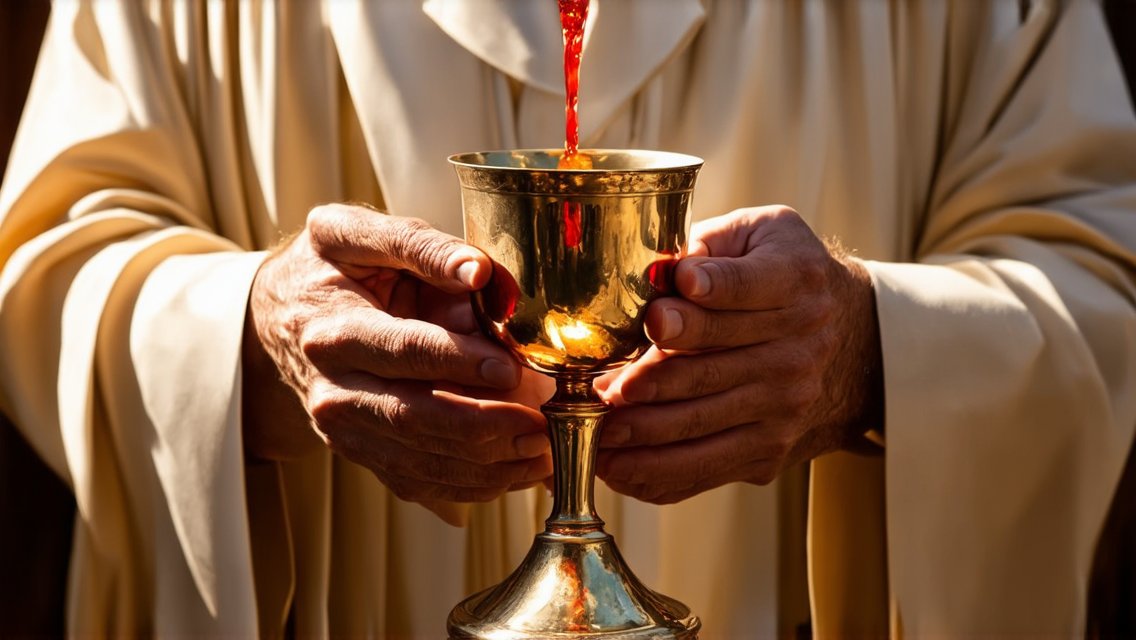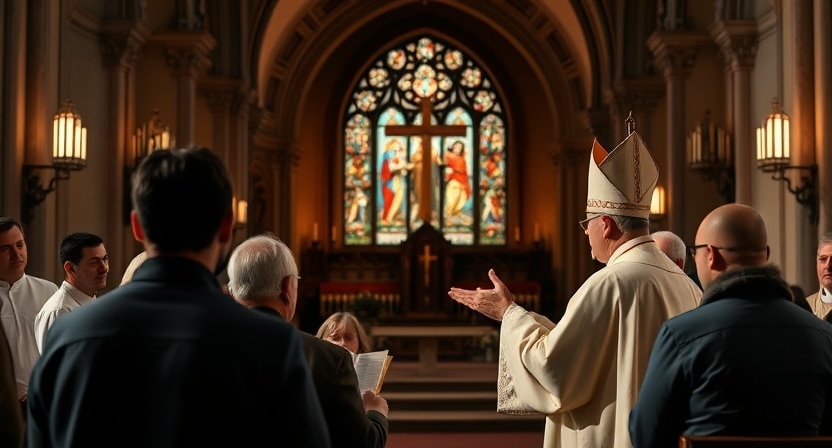THE BODY AND BLOOD OF CHRIST
Jesus: the bread of life
INTRODUCTION AND CONFITEOR
An early Christian writing says this: ‘On the Lord’s day, gather in community to break bread and give thanks. No one who has a quarrel with another person may join your gathering, not until they are reconciled. Your sacrifice must not make me unholy’ (The Didache).
Let us pause then to see if there is anybody with whom we ought to be reconciled. [Pause]
Let us turn to Christ who nourishes us at this banquet.
Lord, in this banquet you nourish our minds with the word of God. Lord, have mercy.
In this banquet you nourish our spirits with the bread of hope. Christ, have mercy.
In this banquet you nourish our hearts with the bread of love. Lord, have mercy.
HEADINGS FOR READINGS
First Reading (Deuteronomy 8:2-3.14-16). The author exhorts the Jews not to forget the God who cared for them in the wilderness by giving them Manna. They are to remember, too, that they need another kind of bread, namely, God’s word.
Second Reading (1 Cor 10:16-17). In the Eucharist we all share the same bread. This means that, however many of us there are, we form one Body in Christ.
Gospel (John 6:51-58). As food and drink nourish the body, so all those who enter into communion with Christ get the nourishment of eternal life.
1st Reading – Deuteronomy 8:2-3, 14B-16A
2 Moses said to the people: “Remember how the LORD your God led you on this long journey through the desert these past forty years, sending hardships to test you, so that he might know what you intended to do and whether you would obey his commands.

3 He made you go hungry, and then he gave you manna to eat, food that you and your ancestors had never eaten before. He did this to teach you that human beings must not depend on bread alone to sustain them, but on everything that the LORD says.
14B “Do not forget the LORD your God who rescued you from Egypt, where you were slaves.
15 He led you through that vast and terrifying desert where there were poisonous snakes and scorpions. In that dry and waterless land he made water flow out of solid rock for you.
16A In the desert he gave you manna to eat, food that your ancestors had never eaten.”
Responsorial Psalm – Psalms 147:12-13, 14-15, 19-20
R. (12) Praise the Lord, Jerusalem.
or:
R. Alleluia.
12 Glorify the LORD, O Jerusalem;
praise your God, O Zion.
13 For he has strengthened the bars of your gates;
he has blessed your children within you.
R. Praise the Lord, Jerusalem.
or:
R. Alleluia.
14 He has granted peace in your borders;
with the best of wheat he fills you.
15 He sends forth his command to the earth;
swiftly runs his word!
R. Praise the Lord, Jerusalem.
or:
R. Alleluia.
19 He has proclaimed his word to Jacob,
his statutes and his ordinances to Israel.
20 He has not done thus for any other nation;
his ordinances he has not made known to them. Alleluia.
R. Praise the Lord, Jerusalem.
or:
R. Alleluia.
2nd Reading – 1 Corinthians 10:16-17
16 The cup we use in the Lord’s Supper and for which we give thanks to God: when we drink from it, we are sharing in the blood of Christ. And the bread we break: when we eat it, we are sharing in the body of Christ.
17 Because there is the one loaf of bread, all of us, though many, are one body, for we all share the same loaf.
Sequence – Lauda Sion
Laud, O Zion, your salvation,
Laud with hymns of exultation,
Christ, your king and shepherd true:
Bring him all the praise you know,
He is more than you bestow.
Never can you reach his due.
Special theme for glad thanksgiving
Is the quickening and the living
Bread today before you set:
From his hands of old partaken,
As we know, by faith unshaken,
Where the Twelve at supper met.
Full and clear ring out your chanting,
Joy nor sweetest grace be wanting,
From your heart let praises burst:
For today the feast is holden,
When the institution olden
Of that supper was rehearsed.
Here the new law’s new oblation,
By the new king’s revelation,
Ends the form of ancient rite:
Now the new the old effaces,
Truth away the shadow chases,
Light dispels the gloom of night.
What he did at supper seated,
Christ ordained to be repeated,
His memorial ne’er to cease:
And his rule for guidance taking,
Bread and wine we hallow, making
Thus our sacrifice of peace.
This the truth each Christian learns,
Bread into his flesh he turns,
To his precious blood the wine:
Sight has fail’d, nor thought conceives,
But a dauntless faith believes,
Resting on a pow’r divine.
Here beneath these signs are hidden
Priceless things to sense forbidden;
Signs, not things are all we see:
Blood is poured and flesh is broken,
Yet in either wondrous token
Christ entire we know to be.
Whoso of this food partakes,
Does not rend the Lord nor breaks;
Christ is whole to all that taste:
Thousands are, as one, receivers,
One, as thousands of believers,
Eats of him who cannot waste.
Bad and good the feast are sharing,
Of what divers dooms preparing,
Endless death, or endless life.
Life to these, to those damnation,
See how like participation
Is with unlike issues rife.
When the sacrament is broken,
Doubt not, but believe ’tis spoken,
That each sever’d outward token
doth the very whole contain.
Nought the precious gift divides,
Breaking but the sign betides
Jesus still the same abides,
still unbroken does remain.
Alleluia – John 6:51
R. Alleluia, alleluia.
51 I am the living bread that came down from heaven, says the Lord;
whoever eats this bread will live forever.
R. Alleluia, alleluia.
Gospel – John 6:51-58
51 Jesus said to the Jewish crowds: “I am the living bread that came down from heaven. If anyone eats this bread, he will live for ever. The bread that I will give him is my flesh, which I give so that the world may live.”
52 This started an angry argument among them. “How can this man give us his flesh to eat?” they asked.
53 Jesus said to them, “Amen, amen, I say to you, unless you eat the flesh of the Son of Man and drink his blood, you do not have life within you.
54 Whoever eats my flesh and drinks my blood has eternal life, and I will raise him on the last day.
55 For my flesh is true food, and my blood is true drink.
56 Whoever eats my flesh and drinks my blood remains in me and I in him.
57 The living Father sent me, and because of him I live also. In the same way whoever eats me will live because of me.
58 This, then, is the bread that came down from heaven; it is not like the bread that your ancestors ate. They later died, but those who eat this bread will live for ever.”
HOMILY
Jesus said: ‘I am the bread of life’. Traditionally we have interpreted this in an exclusively spiritual sense, as if Jesus was talking solely about the Eucharist. For Christians the bread of the Eucharist is of course very special bread. Without it we would not have the strength to follow Christ. But human beings suffer from many kinds of hunger. There is the hunger for ordinary bread. Unless this is satisfied, no life is possible. There is the hunger for love. Unless this is satisfied, a person will always be in anguish. There is the hunger for meaning. Unless this is satisfied, a person will always be dissatisfied. And so on. I would like to think then that the word ‘bread’ has a wider application than the traditional one. Let us turn to the Gospel to see the various kinds of ‘bread’ Jesus offered to people, thus satisfying their many hungers. (What follows could be read as a meditation if the atmosphere is right).
To the people who followed him into the desert, and who were starving, he offered ordinary bread (abundance of it), and so satisfied their physical hunger.
To the leper whose body was falling apart, he offered the only bread that mattered to him – the bread of physical healing.
To Mary Magdalen, the public sinner, he offered the bread of forgiveness, and thus satisfied her hunger for acceptance.
To the lonely woman at Jacob’s well, he offered the bread of human kindness, and thus satisfied her hunger for love.
To the rejects and down-and-outs, by mixing with them and sharing their bread, he offered the bread of companionship, and so satisfied their hunger for self-worth.
To the widow of Naim who was burying her only son, and to Martha and Mary who had just buried their brother Lazarus, he offered the bread of sympathy, and he showed them that even in death we are not beyond the reach of God’s help.
With Zacchaeus, the rich tax collector who had robbed the bread from the tables of the poor, he began by inviting himself to his table. Then, having awakened within him a hunger for a better life, he got him to share his ill-gotten money with the poor.
To the thief who died at his side he offered the bread of reconciliation with God, thus bringing peace to his troubled soul.
We can see then that Christ shared himself with others in many different ways, and under many different forms, before offering himself to them as food and drink at the Last Supper.
But, surprisingly, there were some who refused his offer of bread. There was the rich young man to whom he offered the bread of discipleship, but who refused it because he was not willing to part with his riches.
There was Pilate to whom he offered the bread of truth, but who had no appetite for it because it meant putting his position at risk.
There were the people of his beloved city of Jerusalem to whom, with tears in his eyes, he offered the bread of peace, but they refused it with the result that their city was destroyed.
Then there were the scribes and Pharisees to whom he offered not once, but several times, the bread of conversion, but they refused to eat even a crumb of it.
But to everyone, rich and poor, and to each of us, Christ offers the only bread that will ultimately satisfy the hunger which the heavenly Father has placed in our hearts, namely, the bread of eternal life. He says: ‘Anyone who eats this bread will live forever’.
Who then would not want to be associated with Christ, who alone can fully satisfy all the longings and hungers of our hearts? Once we have been nourished by him, he will send us forth to nourish others.
‘Of bread that nourishes the mind and heart there is scarcely any to be found, even at the tables of the rich.’ (Thoreau).
‘Rings and other jewels are not gifts, but apologies for gifts. The only gift is a portion of thyself. Therefore, the poet brings his poem; the shepherd his lamb; the farmer his corn’. (Emerson).
PRAYER OF THE FAITHFUL
Let us pray that Jesus, the bread of life, may nourish all the hungers of the people of God. R. Give us this day our daily bread.
For all Christians: that the celebration of this Eucharistic banquet may mould them together in a community of love. [Pause] Let us pray to the Lord.
For all government leaders: that they may spare no effort to see that all of God’s children have enough to eat. [Pause] Let us pray to the Lord.
For the lonely who are hungering for the bread of companionship; and the sick who are hungering for the bread of health. [Pause] Let us pray to the Lord.
That through the reception of this bread from heaven we may hunger after a life of goodness and holiness. [Pause] Let us pray to the Lord.
For local needs.
Let us pray:
Father, may the food we eat at this banquet satisfy all our hungers and make us a strong and united community in Christ. We ask this through the same Jesus Christ your Son our Lord, who lives and reigns with you and the the Holy Spirit, one God, for ever and ever. ‘
SIGN OF PEACE
St Paul said: ‘The fact that we share in the one loaf means that we form a single body’. Lord, grant that by partaking in this sacred meal, we may grow in unity; and thus we will enjoy the peace of your kingdom where you live for ever and ever.
COMMUNION REFLECTION
People today are crying out for recognition.
They want to be persons among persons.
They want to be noticed,
not in a showy way,
or because they have money or status,
but just because they are human beings.
Each of us is on a pilgrimage.
We are seeking to encounter others
who have the same needs as ourselves.
The greatest need of all is the need to be loved.
But we pass one another by without noticing,
without the slightest sign of recognition.
As Christians we are united by a bond so close
that St Paul called the Christian community
‘the Body of Christ’.
It is time we began to notice one another.
Each person is a brother or a sister in Christ.
Each person then must be recognised.
Each person must be given some sign of friendship,
be it only a smile or a nod of the head.
CATHERINE DE HUECK DOHERTY


